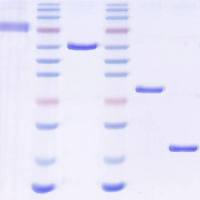Detection of Methyl′Sensitive DNA′Binding Proteins with Possible Involvement in the Imprinting Phenomenon
The molecular basis of parental imprinting is still unknown, but strong evidence points to DNA methylation as one of the mechanisms involved. Expression of imprinted genes was found to be altered in transgenic mice deficient in DNA methyltransferase 1 (Dnmt1) 1 . Recently two new methyltransferases have been identified, Dnmt2 and Dnmt3 2 ,3 , but it remains unclear which of these enzymes has de novo activity and differentially methylates imprinted genes. Parent′specific methylation patterns have been detected in regions of the human and mouse imprinted genes 4 -6 . These regions may present cis′acting elements recognized by methylation′sensitive protein factors that control the allele′specific transcription of imprinted genes. Recently a family of methyl′CpG binding proteins was described 7 . The five members of this family share a similar methyl′CpG binding domain. One of these proteins, MeCP2, is known to be necessary for embryonic development, although the effects on imprinted genes are not as drastic as those seen in Dnmt1 null mutants. MeCP2 binds to methyl′CpGs without apparent sequence specificity and mediates transcriptional repression 8 . This silencing of transcription is mediated by recruitment of a histone deacetylase complex to chromatin′bound MeCP2, causing a local deacetylation of histones and remodeling of chromatin structure 9 ,10 . However, no involvement of MeCP2 in the recognition of differentially methylated regions of imprinted genes has yet been shown.
![预览]()


![DKFZ-PSMA-11,4,6,12,19-Tetraazadocosane-1,3,7-tricarboxylic acid, 22-[3-[[[2-[[[5-(2-carboxyethyl)-2-hydroxyphenyl]methyl](carboxymethyl)amin](https://img1.dxycdn.com/p/s14/2025/1009/171/0405943971658126791.jpg!wh200)



